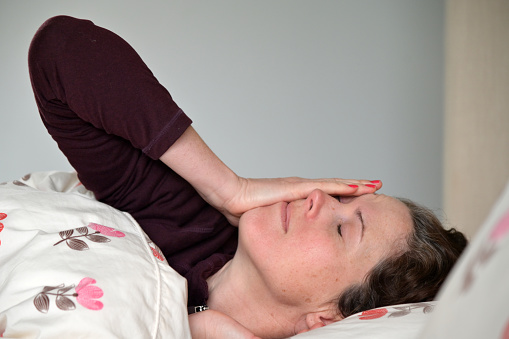Signs You May Have Adrenal Fatigue
Adrenal Fatigue can be one reason you may be why you are exhausted, irritable and unhappy.

A seemingly unrelated series of symptoms such as low libido, feeling light-headed on standing up, finding it difficult to concentrate, having problems with digestion and a series of coughs and colds could be related to adrenal fatigue.
Unfortunately at menopause many symptoms can get ‘lumped in’ as being menopause-related when it could be another factor altogether.
Women are often offered antidepressants to help with low mood and fatigue, but there are some basics you can tackle yourself to help your condition.
What is adrenal fatigue?
This whole series of non-specific symptoms has been named the 21st century disease, and it’s become so commonplace it has been recognised by the World Health Organisation.
Adrenal Fatigue occurs because the adrenals – walnut-sized glands that sit just above the kidneys – get overworked. The adrenals are expected to churn out high levels of the hormone cortisol, traditionally during short-term periods of high stress.
Unfortunately we are now seeming to be in an endless stress cycle whether personal issues or global concerns or the effects of long covid. This means our adrenals can burn out and we turn to stimulants such as caffeine, sugar and alcohol to keep us going.
As well as cortisol, the adrenal glands secrete more than 50 other hormones – including progesterone, oestrogen and testosterone.
The problem is that it is difficult to diagnose, rather like thyroid you will only register if a test shows you to have levels in the highest or lowest 2 per cent that you’ll be deemed ‘abnormal’.
Signs of Adrenal Fatigue
** excessive fatigue and exhaustion
** non-refreshing sleep (you get sufficient hours of sleep, but wake fatigued)
** overwhelmed by or unable to cope with stressors
** feeling rundown or overwhelmed
** craving salty and sweet foods
** you feel most energetic in the evening
** not feeling rested after a full night’s sleep or sleep disturbances
** low stamina, slow to recover from exercise
** slow to recover from injury, illness or stress
** difficulty concentrating, brain fog
** poor digestion
** low immune function
** food or environmental allergies
** premenstrual syndrome or difficulties that develop during menopause
** consistent low blood pressure
** extreme sensitivity to cold
Unfortunately when we are stressed is also when we also tend to make poor choices around our diet and lifestyle. So we head for comfort eating, junk food and trying to hype ourselves up with too much caffeine, chocolate and sugar.
The healthier options of fruit, vegetables and exercise just don’t appeal as we may feel we have too little time to cook or give ourselves a break.
What you can do
Start with the basics so first make sure you have good hormone balance because adrenal fatigue affects the function of both progesterone and oestrogen and they need to work in synchronisation with each other as checks and balances to achieve hormonal harmony and reduce stress.
Many symptoms that arise at menopause are a response to oestrogen dominance, adrenal fatigue and low thyroid so taking some preventive measures really will help.
Diet in this context is not just about losing weight, though that can be a consequence of rebalancing with progesterone and adopting a whole food diet that is high in protein, whole grains, oily fish, fruit and vegetables and low in sugar, fat and alcohol.
It may be the last thing you feel like, but regular, enjoyable, exercise also helps as does more calming pursuits such as yoga, tai chi and meditation.
Additional supplements that are helpful include DHEA, magnesium, a good high dosage vitamin B complex and a gram a day of vitamin C. Some herbs are also traditionally known to support the adrenals, the immune system and help protect the body from physical, mental or emotional stress.
These include:
1 Siberian Ginseng which has the ability to reduce fatigue, increase energy, and enhance mental clarity.
2 Rhodiola which is a medicinal plant used for centuries in Russia and Scandinavia to enhance immune function, and reduce fatigue.
3 Cordyceps — an East Asian extract used to promote overall good health and, more specifically, to replenish immune system function. It also appears to act as an antioxidant in the body, protecting it from free-radical damage.
Helpful information:
Clearly all these symptoms are related to, and are affected by, hormone balance. Whether you are oestrogen dominant, low in progesterone or need additional oestrogen for conditions such as vaginal atrophy, hormones it is good to know the signs.
Not sure? This article can be helpful.
https://anna.blog.wellsprings-health.com/which-hormone-or-hormones-might-you-need/


















